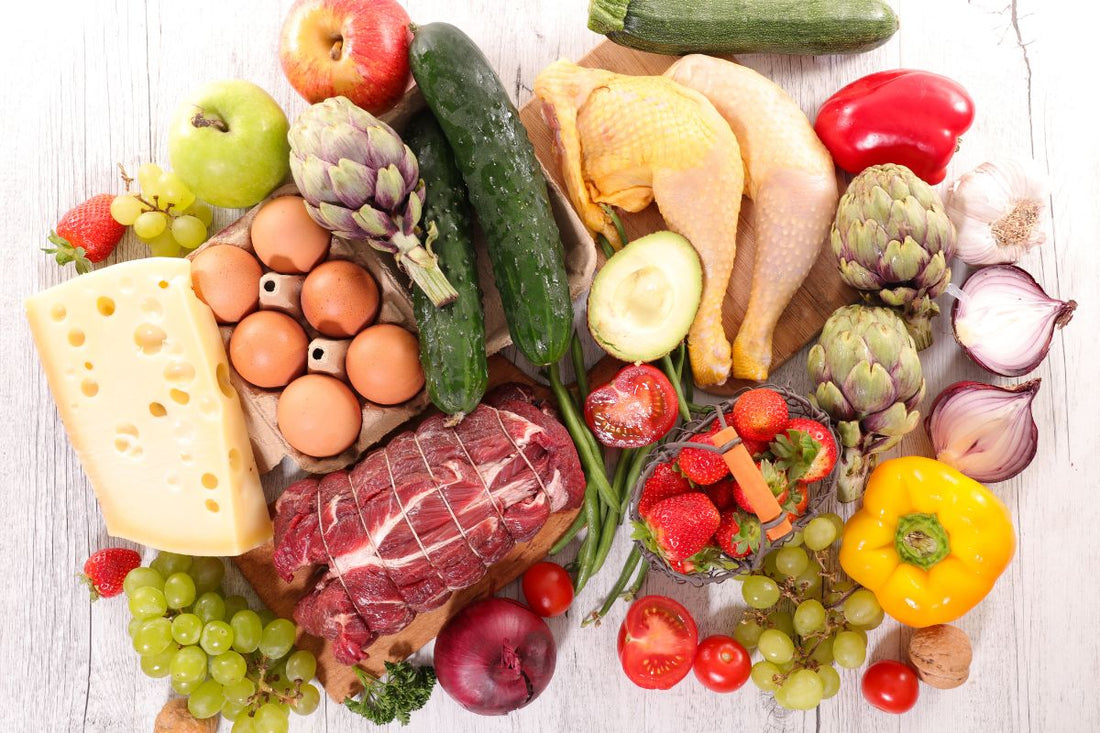Are you feeling tired and run-down? Do you frequently get sick and wish you had a stronger immune system? If so, it might be time to take a closer look at your diet. Incorporating nutrient-dense foods into your eating habits can help boost your energy levels and strengthen your immune system.
Nutrient-dense foods are ones that are packed with essential vitamins, minerals, and antioxidants. These include organic grass-fed and pasture raised meat, wild fish, organic fruits and vegetables, and healthy fats. Such foods provide your body with essential building blocks and energy sources for optimal health and performance. Unlike processed foods that are often calorie-dense but nutrient-poor, nutrient-dense foods deliver the highest amount of nutrition per calorie. This focus on quality over quantity means that you’re not only eating for energy but for comprehensive health. By focusing on these types of foods, you can ensure that you are getting the nutrients your body needs to function at its best.
Incorporating nutrient-dense eating into your daily routine can have a significant impact on your overall health and well-being. Not only will you have more energy to tackle your daily tasks, but you'll also have a stronger immune system to help fight off illnesses and infections.
So why wait? Start incorporating more nutrient-dense foods into your diet today and experience the benefits firsthand. Your body will thank you.
The importance of nutrient-dense eating for energy and immunity
A nutrient-dense diet is the cornerstone of both energy and immunity. High-quality foods rich in essential nutrients allow your body to function at its best. These nutrients fuel your body on a cellular level, enabling efficient energy production, stable blood sugar, and enhanced mental clarity. They also strengthen the immune system by equipping it with the vitamins and minerals it needs to defend against infections.
When you prioritize organic and animal-based foods, you’re not only feeding your body nutrient-rich energy sources, but you’re also reducing your exposure to chemicals, pesticides, and antibiotics that can compromise immune health. Organic fruits and vegetables, for example, have been shown to contain higher levels of antioxidants, while pasture-raised meats have healthier fatty acid profiles and are less likely to carry harmful residues than conventional meats.
Understanding macronutrients and micronutrients
For nutrient-dense eating to be effective, it’s crucial to understand macronutrients and micronutrients and how each impacts the body.
-
Macronutrients include carbohydrates, proteins, and fats, which supply energy and are necessary for maintaining body functions. Organic, animal-based sources of these macronutrients—like grass-fed meats, pasture-raised eggs, and organic dairy—are often higher in essential amino acids, Omega-3 fatty acids, and other beneficial compounds.
-
Micronutrients include vitamins and minerals such as Vitamin C, Vitamin D, zinc, iron, and magnesium. Micronutrients are found in smaller amounts in food but play critical roles in energy metabolism, immune response, and cellular repair.
Consuming a balanced diet that includes a variety of both macronutrients and micronutrients, especially from organic and animal-based sources, ensures that your body has all it needs to stay energized and resilient against illness.

Top nutrient-dense foods for energy and immunity
Certain foods stand out in their nutrient density and ability to enhance energy and immunity, particularly when they come from organic or animal-based sources:
-
Grass-Fed Beef – Loaded with essential proteins, iron, B vitamins, and Omega-3 fatty acids, grass-fed beef supports energy production, muscle health, and immune function.
-
Wild-Caught Salmon – Rich in Omega-3 fatty acids, vitamin D, and selenium, wild-caught salmon boosts brain function, energy, and immune health.
-
Eggs from Pasture-Raised Hens – Organic eggs provide high-quality protein, B vitamins, and choline, all necessary for brain health and energy.
-
Organic Leafy Greens – Kale, spinach, and Swiss chard are packed with antioxidants, vitamin C, vitamin K, and magnesium, supporting immunity and cellular health.
-
Liver (Grass-Fed or Pasture-Raised) – Liver is a powerhouse of B vitamins, iron, vitamin A, and folate, making it one of the most nutrient-dense foods on the planet for energy and immunity. Pro tip, if you can't stomach eating cooked liver, try a desiccated organ supplement from Heart and Soil Supplements.
-
Organic Berries – Blueberries, strawberries, and raspberries are antioxidant-rich, promoting immune strength and reducing inflammation.
-
Healthy Fats from Organic Sources – Fats like grass-fed ghee, olive oil, and avocado oil provide Omega-3s and Omega-9s, which help stabilize energy and support cell health.
-
Bone Broth – Made from grass-fed or pasture-raised animal bones, bone broth is rich in collagen, amino acids, and minerals like magnesium and calcium, supporting gut health and immune function.
Meal planning for nutrient-dense eating
Effective meal planning makes nutrient-dense eating sustainable and enjoyable. Here’s how to incorporate it into your daily routine:
-
Plan Balanced Meals – Create a meal plan that includes balanced portions of protein, healthy fats, and vegetables. For breakfast, consider organic eggs with sautéed greens in grass-fed ghee. At lunch, include a source of protein like grilled chicken with a colorful salad, and for dinner, try a wild-caught salmon fillet with roasted root vegetables.
-
Choose Organic and Grass-Fed Options – Opt for organic fruits, vegetables, grass-fed meats, and pasture-raised eggs whenever possible. These choices ensure you’re avoiding unnecessary chemicals and additives that may be present in conventional options.
-
Make a Grocery List – Prepare a list of ingredients based on your meal plan to keep yourself organized and prevent impulse buys.
-
Batch Cook and Prep – Prepare meals or portions ahead of time, like roasted vegetables or grilled chicken, to make it easier to assemble nutrient-dense meals during busy weekdays.

Recipes and meal ideas to boost energy and immunity
Here are a few meal ideas to kickstart your nutrient-dense journey:
-
Breakfast: Start your day with a nutrient-packed smoothie made with spinach, blueberries, grass-fed raw milk, and a scoop of grass-fed collagen protein powder. For extra energy, top with a tablespoon of organic almond butter.
-
Lunch: Prepare a salad using mixed organic greens, pasture-raised eggs, corn and soy free bacon, cherry tomatoes, cucumber, avocado, and a sprinkle of goat cheese. Drizzle with olive oil and lemon juice for added flavor.
-
Dinner: For dinner, try baked wild-caught salmon seasoned with fresh herbs, accompanied by a serving of organic quinoa and a side of roasted vegetables like Brussels sprouts and sweet potatoes.
Remember, the key is to focus on whole foods and incorporate a variety of nutrient-dense ingredients into your meals.

Tips for incorporating nutrient-dense foods into your diet
Making the switch to nutrient-dense, organic, and animal-based foods doesn’t need to be overwhelming. Here are a few tips to help you get started:
-
Introduce New Foods Gradually: Add one new nutrient-dense food to your meals each week to explore flavors and health benefits without overwhelming your diet.
-
Experiment with Recipes: Trying new recipes that feature nutrient-dense ingredients keeps meals exciting and flavorful. Look for organic and farm-to-table cookbooks or websites to get inspired.
-
Make Simple Swaps: Replace processed foods with whole foods. Instead of reaching for packaged snacks, opt for nuts, fresh fruit, or cheese from pasture-raised sources or making your own baked treats.
-
Prioritize Hydration: Staying hydrated is essential for energy and immunity. Make sure to drink plenty of filtered water and incorporate hydrating foods like cucumbers and citrus fruits into your diet.

The role of hydration in energy and immunity
Water is essential for nutrient transport, waste removal, and temperature regulation. Dehydration can cause fatigue, brain fog, and lower immune function. Drinking at least eight glasses of filtered water each day is crucial, especially when following a nutrient-dense diet. You can also include hydrating foods like melons, cucumbers, and citrus to support your hydration needs.
Supplements to Support Energy and Immunity
Although nutrient-dense foods should be the primary source of vitamins and minerals, there are situations where supplements can be beneficial. Consult a healthcare provider before adding supplements, but here are a few commonly recommended for energy and immunity:
-
Vitamin C – Known for its immune-boosting properties, Vitamin C supports the body in fighting infections and inflammation.
-
Vitamin D – Essential for immune health, particularly in winter months or for those who don’t get much sun exposure.
-
Zinc – Important for immune function and wound healing, especially beneficial during cold and flu season.
-
Probiotics – Support gut health, which is closely linked to immunity. Look for a high-quality probiotic or consume fermented foods like kefir and sauerkraut.
Supplements to support energy and immunity
While a nutrient-dense diet should provide most of the essential nutrients, certain circumstances may warrant the need for supplementation. Consult with a healthcare professional to determine if any specific supplements would benefit your energy and immune health.
Common supplements that support energy and immunity include vitamin C, vitamin D, zinc, and probiotics. However, it's important to remember that supplements should not replace a balanced diet but rather complement it.

Lifestyle factors that impact energy and immunity
In addition to nutrient-dense eating, there are other lifestyle factors that can impact your energy levels and immune function. Getting regular exercise, managing stress levels, prioritizing sleep, and practicing good hygiene all play a role in maintaining optimal health.
Regular physical activity improves circulation, boosts mood, and supports a healthy immune system. Find activities you enjoy and aim for at least 150 minutes of moderate-intensity exercise each week.
Managing stress is crucial as chronic stress can weaken the immune system and lead to fatigue. Incorporate stress-management techniques such as meditation, deep breathing exercises, or engaging in hobbies that bring you joy.
Lastly, prioritize sleep as it is essential for energy restoration and immune function. Aim for seven to eight hours of quality sleep each night by establishing a consistent sleep schedule and creating a relaxing bedtime routine.
Conclusion: Taking charge of your health with nutrient-dense eating
Incorporating nutrient-dense eating into your daily routine is a powerful way to boost your energy levels and strengthen your immune system. By focusing on whole, nutrient-rich foods and making small, sustainable changes, you can experience the benefits firsthand.
Remember to plan your meals, experiment with new recipes, and stay hydrated. Consider incorporating supplements if necessary, and prioritize lifestyle factors that support energy and immunity.
Take charge of your health today by embracing nutrient-dense eating. Your body will thank you with increased energy, a stronger immune system, and overall improved well-being. Start your journey towards optimal health and vitality now.
Hunghee Ancestral Energy is packed with the most bioavailable nutrients for peak performance and adventure - nutrition as nature intended. Whether you are a professional athlete, outdoor adventurer, or just hangry, Hunghee’s on-the-go 1oz superfood energy packs make it easy and convenient to ensure sustained energy for any activity. Made with animal-based nutrients including organic grass-fed ghee, local raw honey, and ancient sea salt, Hunghee provides a smooth release of energy. So next time you hit the trail or prepare for a long day, try a Hunghee!
Disclaimer: This content is for informational purposes only and is not intended as medical advice. Please consult your healthcare provider for advice about a specific medical condition or before starting any new fitness or nutritional program.

